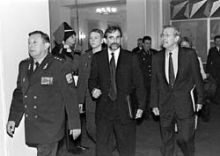The visit by the US Secretary of Defense Donald Rumsfeld to Ukraine was significant for a number of reasons. It was the first visit, essentially an exploritory one, of a high US administration official to Ukraine. Interestingly, the representatives of the younger Bush administration are not shy to admit that they have yet to learn and understand many things, including some about Ukraine.
“A stable and prosperous Ukraine oriented toward the West, Europe, and NATO structures is vital to the United States and Western countries,” Rums feld said, addressing a press conference, which makes it possible to conclude that the United States will at least continue its earlier policy toward Ukraine with continuing pressure on its leaders.
Suffice it to recall last year’s outburst by Defense Minister Oleksandr Kuzmuk leveled at then US Secretary of State Madeleine Albright, sparked by her remark that Ukraine should give more attention to military reform. By contrast, speaking at a press conference after signing a protocol on cooperation between Ukrainian and US defense ministries, Kuzmuk declared that the document reflects “a complete coincidence of views on the important avenues of our cooperation.” As Kuzmuk stressed, there is a common vision of Ukraine’s role in KFOR and of the threat posed by the Balkans situation. The protocol on cooperation, however, also envisions joint efforts to implement a state program to reform Ukraine’s Armed Forces, something the representatives of the former US administration and NATO leaders discussed with the Ukrainian leaders.
Typically, representatives of any US administration like to engage in lecturing Ukrainians on the need for reform. As worded by Rumsfeld, it sounded like that: he discussed with President Kuchma “the importance of past and additional future reforms.”
One thing which the Pentagon chief learned in Ukraine is that transition from Communism to the market economy is an uphill task, but Ukraine is consistently implementing it, admitting that there are no textbooks teaching how to succeed in this.
Apart from the astonishment voiced by Rumsfeld at how well Ukraine’s leaders are doing, going uphill, there is one important conclusion: Ukraine’s image will depend on how the country manages its problems.
US negotiators stressed that “the United States is fully committed to consultations with Ukraine during the development of our joint programs,” a phrase uttered by them for the first time during the current visit. Translated from diplomatic language, this might mean that Ukraine can rely on Washington in some cases. But only in some. If it suits US interests, if Ukraine behaves, and so on.
One issue, however, remained on the sidelines of the meeting of two defense ministers, whether the United States will recognize Ukraine as a full player in the multilateral consultations on the 1972 ABM Treaty, which Washington wants revised and which Moscow and Beijing want left intact. Rumsfeld pledged that America “will continue consultations, specifically with Ukraine,” while Minister Kuzmuk declared that Ukraine is entitled to participate in the talks as an heir to the Soviet Union and as the first country to scrap its nuclear weapons. But Kuzmuk stressed that the issue should first be solved by the United States and Russia.
Perhaps for the first time since the fall of last year, one of the Ukrainian leaders, specifically Gen. Kuzmuk, has again confirmed Ukraine’s choice to integrate with NATO structures, speaking on the eve of his recent visit to Greece for the meeting of Southeast European defense ministers. Thus, Kyiv and the new US administration have spoken their first words to each other. With regard to Russia and probably due to its mammoth size, Washington used a different tactics for their first encounter, a meeting of Putin and Bush in Slovenia. But it is not the form that is important. What is behind the form could be more than interesting, the first American-Russian differences on antimissile defense, the first cracks appearing in the relations between the US and Europe (the same antimissile defense and the scandal involving the Echelon tracking system).







